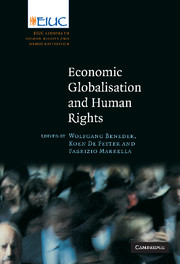Book contents
- Frontmatter
- Contents
- List of contributors
- Series editors' preface
- Preface
- List of abbreviations
- Introduction
- PART I Inter-disciplinary Perspectives on Human Rights and Economic Globalisation
- Economic Globalisation, Globalist Stories of the State, and Human Rights
- Towards a Theory of Global Ethics in Support of Human Rights
- Localising Human Rights
- Globalisation and Social Rights
- PART II The Relevance of Human Rights for International Economic Organisations
- PART III International Corporate Accountability
- Index
Localising Human Rights
Published online by Cambridge University Press: 09 July 2009
- Frontmatter
- Contents
- List of contributors
- Series editors' preface
- Preface
- List of abbreviations
- Introduction
- PART I Inter-disciplinary Perspectives on Human Rights and Economic Globalisation
- Economic Globalisation, Globalist Stories of the State, and Human Rights
- Towards a Theory of Global Ethics in Support of Human Rights
- Localising Human Rights
- Globalisation and Social Rights
- PART II The Relevance of Human Rights for International Economic Organisations
- PART III International Corporate Accountability
- Index
Summary
Introduction
Economic globalisation – understood as a process of breaking down State barriers in order to allow the free flow of finance, trade, production and at least in theory, labour – affects human rights. It affects the role of the main duty holder in human rights, the State, both in the world and the domestic economies. Globalism, the ideology supporting economic globalisation, favours the withdrawal of the State from the provision of many services essential to human rights, and its replacement by private actors. It also insists on opening up the economy to products, services and investments originating in countries that enjoy a competitive advantage, and on discipline in taking the advice of international trade and financial organisations.
From a human rights perspective, economic globalisation raises questions about the human rights responsibilities of private actors, of intergovernmental organisations and of third States when their actions have extraterritorial effects. There is also an urgent need to rethink human rights obligations of States. This is often a very technical issue, requiring knowledge of the law of international contracts and arbitration and of domestic administrative law.
Inevitably, a part of the human rights response to economic globalisation needs to take place at the global level – hence the discussions on the human rights accountability of the World Bank, the role of human rights in the World Trade Organization (WTO) dispute settlement system, or the efforts to codify the human rights responsibility of corporations.
- Type
- Chapter
- Information
- Economic Globalisation and Human RightsEIUC Studies on Human Rights and Democratization, pp. 67 - 92Publisher: Cambridge University PressPrint publication year: 2007
- 34
- Cited by

